Warner Williams and Jay Summerour – It Gets Right Into Your Soul
By Frank Matheis (with photographs by Bibiana Huang Matheis and Frank Matheis) – unedited version as published in Living Blues magazine – Issue # 253. Vol. 49, #2. April 2018
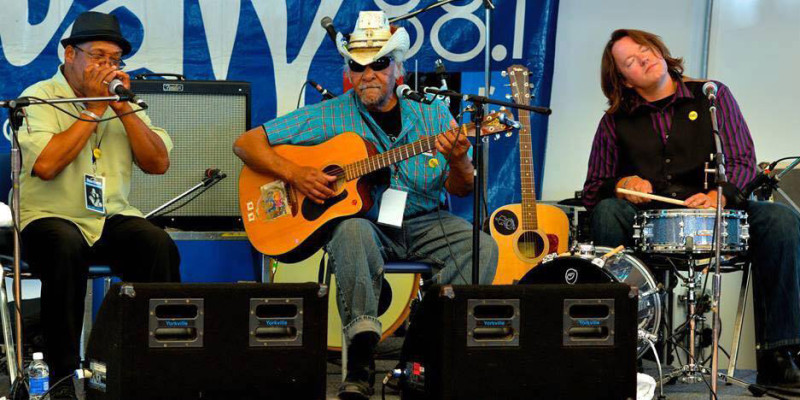
Songster Warner Williams used to be taciturn. Now he is outright uncommunicative. He is generally distrustful of people outside of his close inner circle, and just a little grumpy, well OK, kind of gruff. Even though his partner of 30 plus years, harmonica player Jay Summerour, assured me that Warner actually really liked me a lot, as we had spent time together at music festivals, it was hard to prove it in the interview attempts for this article. Jay always calls him “Mister Warner.” His laconic nature, coupled with his extremely bad hearing, tanked the interview. After all, Mr. Warner is no spring chicken at 87. His partner Jay was exasperated, “Mr.Warner won’t get no hearing aide. He can’t hear and he won’t get a hearing aide.” It’s true, but when you hear him play and sing it seems unbelievable. How can someone play so well and simultaneously be hard of hearing? He’s like Beethoven in that way.
For this article, we had to rely on Jay Summerour, 20-years Mr. Warner’s junior, who is the complete opposite of Warner – warm, fun-loving, friendly, open and talkative, making the good-natured guy the perfect spokesperson for the duo. He is also an excellent harmonica player. Dr. Barry Lee Pearson, who had warned me in advance that getting anything out of Warner nowadays would be a struggle, kindly allowed me to refer to his interviews done with Warner.
When the talking part of the interview bombed, we went out to take some fresh photos and suddenly, as the cameras came out again in the middle of the shoot, Warner turned to me and said, in his raspy deep Maryland rural dialect, “Why are we doing this?” Jay interceded and patiently explained the merits of getting a cover story in a major music magazine like Living Blues to his partner. Mr. Warner wouldn’t have any of it. “That don’t mean shit to me”, he goes, with a disapproving scowl, “I need some damned money now.” Trying to salvage the project, after a long trip from New York to Washington, D.C., I made an unusual offer, “Warner, I tell you what. Whatever I get paid for writing this article I’ll give to you.” Unperturbed, nonetheless he persisted to gently shake me down: “Bullshit, that don’t help me nothing. I need the damned money now. I ain’t got no money. Later don’t cut it. Later never comes.” I dutifully went to the ATM machine, withdrew a hundred dollars cash, the amount Warner was ready to settle for, and this appeased the old bluesman. After that we were good and the photo shoot continued. “Warner is like that”, said Jay, “he’s not too trusting.” Afterwards we took them out for lunch. Warner wanted fried chicken. We drove all over Rockville, Maryland, until we finally found a chicken shack. Warner ordered fish and never said another word.
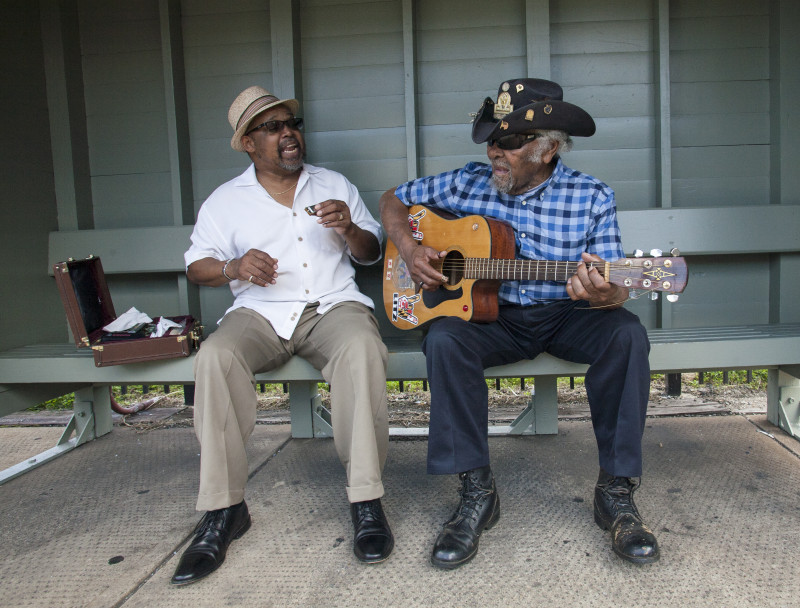
Perhaps his distrust and apprehension is grounded in good reason. Why should he trust yet another bearded white guy with a hat who comes along with promises of something good coming up later, when so often “later” never comes? The false promises and lies Warner Williams has been told over a lifetime are good enough reason for distrust. “Pay me now!” made good sense to me.
There is often a sad irony in the blues, and certainly when it comes to the careers of this superb duo. The Washington Postcalled Warner Williams “one of the last great songsters.[1]” Here is a bluesman who worked a day job all of his life, driving a garbage truck, and played music on the side. He made numerous excellent records and was dignified with the greatest cultural award the United States bestows on its traditional artists, the National Heritage Fellowship, often referred to as “the Living Cultural Treasure Award.” Yet, real fame has eluded the Piedmont songster. After he won his National Heritage Fellowship, the same award won by B.B. King, John Lee Hooker, Phil Wiggins and Bill Monroe, among others, he was still busking in the Washington, D.C. Metro station at Shady Grove.[2]Busking has been part of his musical life from the get-go, something he’s done all his life since his teen years. Unlike his regional peer and erstwhile rival, John Cephas, he never won a W.C. Handy blues award, never traveled the world or played the biggest venues of the world – and he surely has not reaped any real financial award. That does not imply that the duo has not had its share of successes. They are a very popular roots & blues duo with plenty of local gigs and some good festival bookings. Whenever they play in venues, large or small, people love their musicality and polished interplay. After decades of playing together, the duo communicates intrinsically, fitting tightly to harmonize their singing, with Jay holding the harmonica riffs to assure that it’s always about the song, always playing it tastefully and just right. Warner falls into the song and becomes one with the music, mostly looking down – as if shutting out the world, swiftly moving through his sizeable repertoire, while Jay plays along, clearly having a good time. Everyone who knows this country blues duo recognizes them for who they are and what they can do, yet they are unfathomably largely unsung, deserving much greater fame and recognition.
The motley duo could be scripted out of a Hollywood Movie. Jay in his stingy brim hat, slightly corpulent and ever affable, seemingly always smiling. Warner, with the dark shades and cowboy hat, slightly aloof, a distinct character. To say that Warner lives for music, and loves to play, would be a vast understatement. Even now, in his late 80s, Williams, likes to be called “Guitar Man” and he is seemingly insatiable as a tireless performer. After years of working together as partners, the pair has an interesting dynamic. Nowadays, Jay is the caretaker, perhaps the only person Mr. Warner will listen to, and sometimes they bicker like an old married couple. When on tour, Jay does the driving nowadays. They used to cruise in Mr. Warner’s famous white van with cow horns and stick-on letters “Guitar Man.” After a gig, long after all his musical partner has gone to sleep, Mr. Warner can still be found in the hotel lobby playing and singing to entertain the night clerk, sometimes to their enjoyment and often to their annoyance. Late arriving hotel guests sometimes get their camera out and photograph the idiosyncratic, untiring old bluesman, surprised to meet such a wonderful player most unexpectedly. In the mornings, Mr. Warner is already back at playing before everyone even gets up, sitting in the hotel lobby ready to sing and play some more, unfolding his wide repertoire of country blues, entertaining people as they show up for breakfast. Even now, after more than 70 years of playing, he is a captivating singer and picker who will rapt any audience any place, any time of day. He must have sung, “Hey Bartender, there’s a big bug in my beer. . . Big ole bug drinkin’ all my brew,” and “Key to the Highway” a million times. Their playing style is perhaps best described by the title of one of their three Patuxent Music albums as “down-n-dirty.” That little record label, operated by sound-maestro Tom Mindte, released three of their albums: Little Bit a Blues, Down-n-Dirtyand Warner’s solo Christian Jubilee.
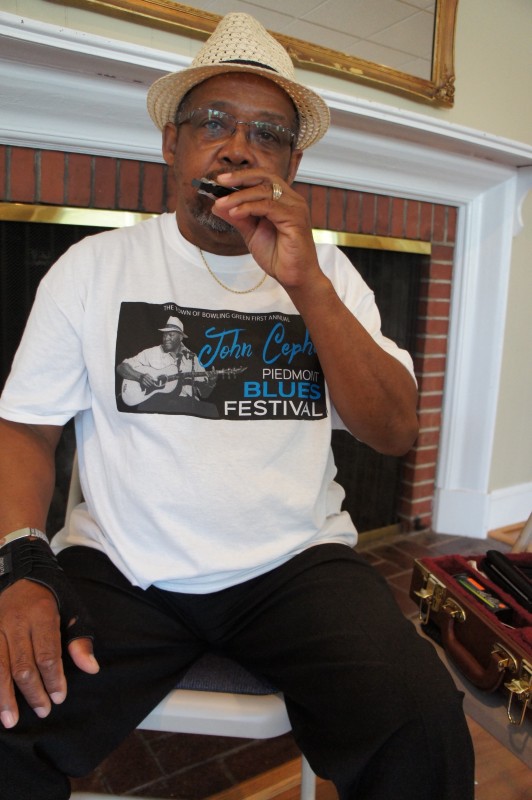
Lots of people claim to be from the notorious school of hard knocks, but Warner Williams embodied the actual hard life version. He grew up poor, and made it busking on the streets in racially charged times in Takoma Park, Maryland, on the outskirts of Washington, D.C. He is a survivor, a man as talented as he is tenacious, and he suffers no fools. He met all kinds of characters, had his fights and lived to tell about it. He told Barry Lee Pearson[3], “I used to play for house hops and people get to fighting and carrying on. You might have a little party at your house and you invite everybody in the neighborhood. Bring your little music and have you a little fun. And back at that time, people dance with your wife or something. Some people get mad because you’re dancing and it turns into violence. They wouldn’t hardly bother the music man, but the music man gets hurt by being there. I’ve been in a whole lot of those places where people get shot right down and I’m still picking music.” One look at his weathered face and his rough hands, one glimpse in his sad, droopy eyes, and you can see inside the soul of a wary man who has been through it all. That part of his persona is seldom seen because he usually masked by super-dark wrap-around sunglasses and his trademark cowboy hat, adorned with a big fire department emblem, like Bo Diddley had, with numerous little souvenir pins. By now Warner shows his ripe old age, a little hunched over when he walks, but when he plays he still shines like a youngblood, his hands swiftly moving over the fretboard.
Like many other musicians from the mid-Atlantic region, and especially around Washington, D.C., his blues started homegrown, stayed mostly regional and relatively obscure. Even though he is a superb guitarist and singer with a vast repertoire, many lesser musicians from famous blues localities have done much better in achieving international acclaim, perhaps because Washington, D.C. does not have an exciting blues story to tell, or perhaps because of personal reasons and decisions. As a famous music author told this writer, “Washington, D.C. is not that interesting because it is not the founding place of rock and roll.” It’s true. Washington, D.C. always had it going on, but most people just didn’t know it. John Hurt and Skip James lived here. Elizabeth Cotten, Mike Seeger, Flora Molton, Esther Mae “Mother” Scott, Wilbert “Chief” Ellis, Archie Edwards, John Cephas and Phil Wiggins, John Jackson, Eleanor Ellis, Larry Wise, Ben Andrews, Rick Franklin, Michael Baytop, Danny Gatton, Roy Buchanon, John Fahey, Charlie Sayles, and many others, mostly obscure, like the mysterious Gaines Brothers. It’s a reality that Jay and Mr. Warner played their down-home blues mostly at home. They had some great festival gigs all over the country, but mostly it’s been local and regional with several critically acclaimed albums on the Patuxent, Smithsonian Folkways, and Orchard Record labels.
The Maryland based duo is sometimes billed as Little Bit a Blues, with drummer Eric Selby. In and around the D.C. region they are a regular fixture, an integral part of the musical landscape. Like Cephas & Wiggins they carry on the guitar-harmonica tradition of Sonny Terry and Brownie McGhee, a duo that Jay Summerour has often described as his idol.
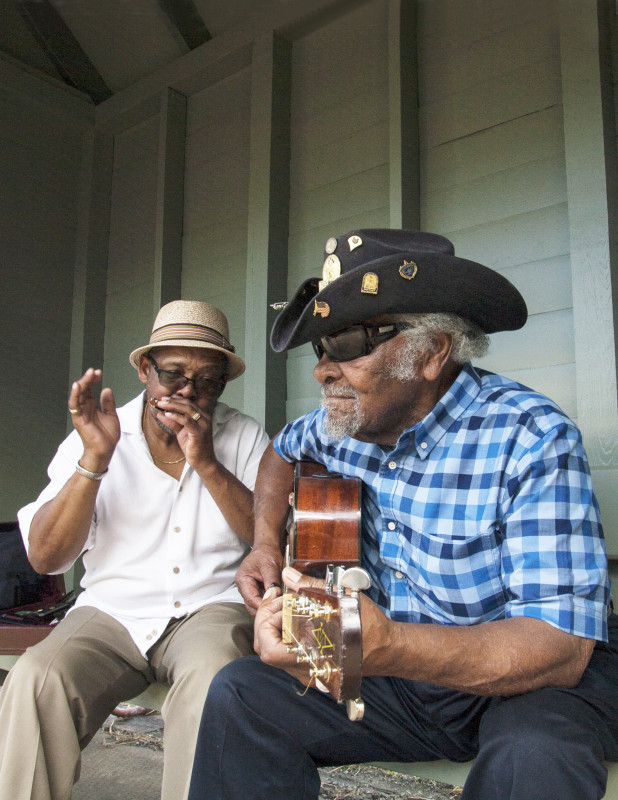
Williams was born in Takoma Park in 1930 to a musical family, when that suburb of Washington D.C. was still rural with cornfields. Maybe that’s why Warner still refers to himself as a “country boy.” He’s been playing music for most of his life, first within the family and then in house-parties, picnics and festivities, as was typical for the entertainers within the African American community. For a while he was a street-busking kid, earning change on the streets of Maryland and Washington, D.C. – and he’s worked street corners all his life. He played and sang in church, in taverns and juke joints. Truly a guitar virtuoso who can play many styles including blues, country, hillbilly, gospel and anything in between, he is at home no matter what style, including the pop music of the time. Some blues fans will wonder why the Warner Williams and Jay Summerour repertoire includes a number of country music songs, an element that is typical for the regional country blues songsters who often learned songs from their white neighbors and the radio. Warner frequently says, “Country ain’t nothing but the blues.” Dr. Barry Lee Pearson defined him as a songster and cited that Williams won a prize on a local radio program playing Ernest Tubb’s Walking the Floor Over You.[4](This song was also beloved by John Jackson, and is an example of the integration of the Piedmont Blues to include all kinds of influences, including blues, ragtime, country, Appalachian mountain music and popular music from radio shows, especially the Grand Ol’Opry.) Mr. Warner told interviewer Barry Lee Pearson for a 1999 Living Blues article[5], “The most music that I come up with around here, some people call it hillbilly music. I could play that better than I could lay blues because I was raised up around white people and that’s all we sang together.” He surely did learn to play blues and has often cited influences from Blind Boy Fuller, Lightnin’ Hopkins, and Muddy Waters, to country artists Hank Williams, Ernest Tubb, and Gene Autry, as well as jazz, big band, and popular tunes. Warner Williams sings in a weathered, ethereal tenor going on baritone, with a guitar style that is reminiscent of the great Eddie Pennigton, with whom he could hold his own with equal technical prowess, even in his ripe age and stressed hands. Like his local compatriots John Jackson and John Cephas, Mr.Warner had worked hard for all of his life, and made his living as a garbage truck driver for the Maryland-National Capital Park and Planning Commission to support his wife and eight children, playing music during evening and weekends.
Mr. Warner has earned himself a bit of a reputation as a womanizer. While we were taking photos out on the street, two different young attractive women came over to hug him, right there on the sidewalk. Oh, the power of flirtatious transformation. The demure musician ate it up and suddenly beamed ear to ear. Another young woman recognized him and recalled seeing his shows. Later, at a shopping mall, a male fan approached him and asked how the music was going. We couldn’t make a turn without people greeting Warner, a genuine local celebrity.
Jay Summerour, born 1950 in Rockville, Maryland, is the soulful counterpart to Williams, a great harmonica player who learned the diatonic harp from his grandpa, Smack Martin, who played the juke joints. Jay spent the last 30 years partnering with Warner Williams, sometimes singing and whistling with Williams, mostly backing him up swiftly on harmonica. Whistling is not often thought about, but Jay can whistle in a lovely way, like a bird or Bing Crosby, with remarkably aesthetic skill. He nowadays also plays with other local musicians, like Eleanor Ellis, when Mr. Warner is not up for it. He plays the traditional style, filling it in just right, never overplaying and tastefully accentuating the songs. Jay may be subtle, but he has the chops and skills and he carries on a long tradition of country blues harmonica with smooth elegance. Whatever they play has a rustic, ethereal undertone, a reflection of two lifetimes of playing while working full time jobs to support their families. Summerour was a school bus driver in Rockville, Maryland.
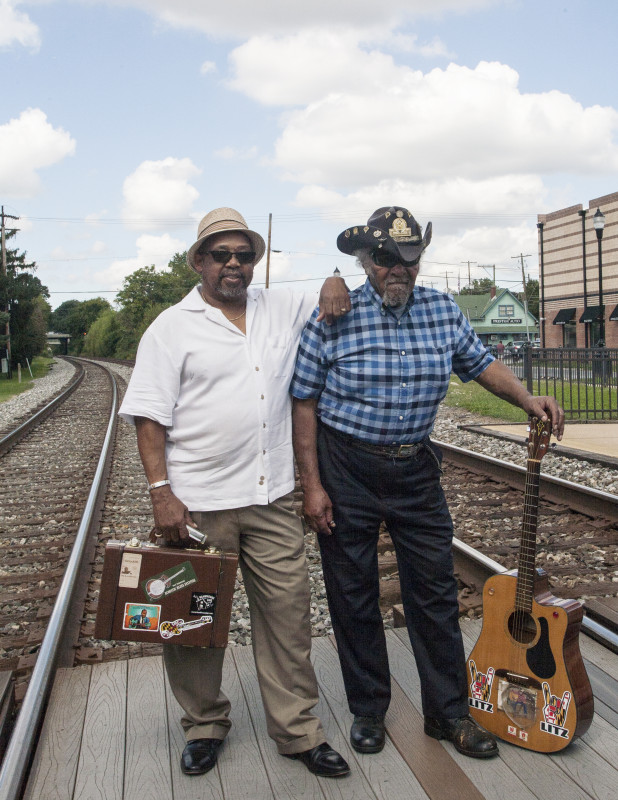
Together Warner Williams and Jay Summerour are proudly one of the last, great guitar-harmonica duos. Jay is tireless. He just recently helped another regional musician, Michael Baytop, complete an album on Patuxent Music. Baytop, one of the local D.C. legends, who sings, plays guitar and bones, and was incapacitated by a major stroke. They finished the album with the help of Washington, D.C. bluesman Mark Puryear playing the guitar parts and Tom Mindte, who is also the producer and recording engineer, on mandolin.
Jay Summerour told Living Blues,
“I guess that was about 30 years ago and I was traveling around with a bunch of different bands and I came home and Warner was at my cousin’s house, and they wanted him to meet me. So, he came over to my apartment and he had his guitar with him, of course – he always did. We sat down on the couch and played music, and we’ve been playing together ever since. He used to do open mics all the time – so he started taking me with him. We would go to Gallagher’s and Susanne’s American Kitchen and lots of places in Gaithersburg and play open mics. We did that for about maybe five or six months – and Nick Spitzer from the Smithsonian[6]heard about us and he found us and asked us if we wanted to do a recording for the Smithsonian. So that’s how we first got started with the Smithsonian Folkway Records (Blues Highway: Live- Smithsonian Folkways). We did our first cassette tape in ’91 in the basement of Bill Danoff of the Starland Vocal Band. And we released our first CD in 1999.
We used to go to Archie Edwards’ barbershop[7]. Back then it was just Eleanor Ellis, Phil Wiggins, Archie, Mike Baytop, NJ Warren, and Mr. Bones all playing around the barbershop. Archie and Mike Baytop and NJ and Mr. Bones – they used to ride out to my house in Rockville, and then they came to my house in Poolesville.
I got started in harmonica because my grandfather Smack Martin used to play. My grandfather played with this guitar player from across the street named B. Cliff – who used to play a lot of gospel and blues. Matter of fact, Mr. Warner used to play there too in the backyard. You’d get a whole lot of musicians used to sit around in this neighborhood – Mr. Warner, my grandfather, my uncle – just a lot of guys got together every weekend to play. I always said that I’d like to sit around and play music like them – that’s what I wanted to do for a living. I never knew that I would, but I always said I’d like to. I mean, people used to come from all over and listen to that.
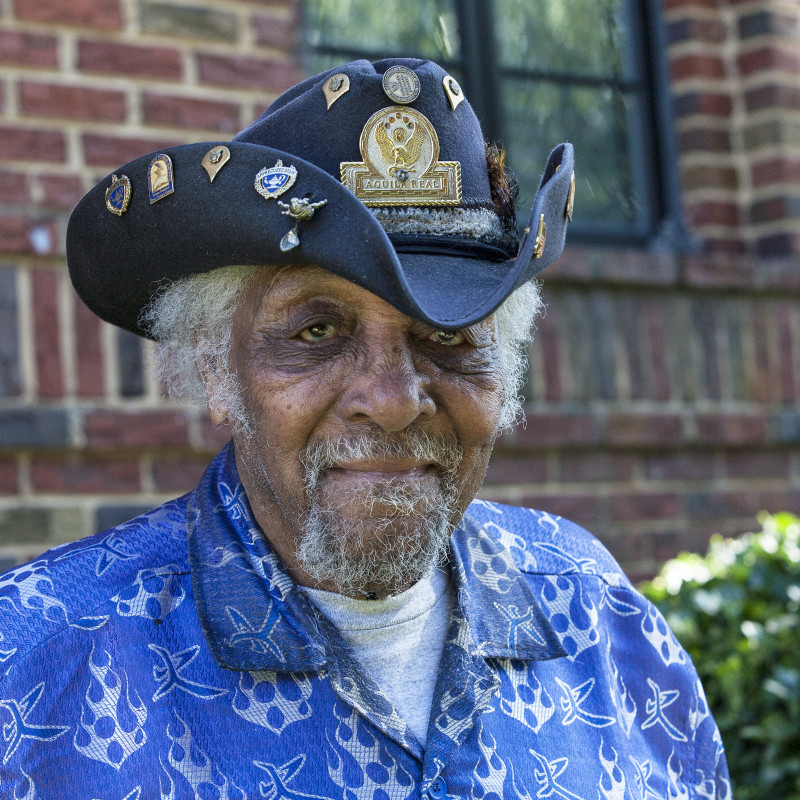
My mom played with a women’s softball team called the Wonderettes, and they used to have blues bands perform all the time, so I’d see all those blues bands come to the ballpark. They’d have ballgames, cookouts and dances at night. And a they’d play blues – James Brown, Little Richard, all these guys – Etta James, Koko Taylor – they used to call it the Chittlin’ circuit. I was about 9 years old when I first started playing baseball and hearing all these guys. So that’s where I got it from. When I was young I got to meet lots of amazing people in their dressing room. I got to meet Sonny Terry and James Cotton. Sonny Terry was my idol and I learned that he was my mother’s first cousin. So the harmonica is in my blood, so to say. It’s in my family.
Mr. Warner used to be on a TV show – him and his dad. His dad used to play a fiddle and violin and guitar – everything. They used to go downtown D.C. from Takoma Park – Warner lived at New Hampshire Avenue where you first come to the District line in Maryland and Takoma Park. They used to catch the bus down to Foggy Bottom and play down there all the time on the corner down in D.C. When Warner got married he moved out to Olney from there. He’s been playing a long time. He used to with a big-time band and a soul band, the Moroccans, and blues band back in the day, and they were pretty good too. But they played all the dances and juke joints. He’s been around for a long time. A lot of people know Mr. Warner.
We never toured internationally because Warner wouldn’t fly. We’ve been asked a couple times by the Smithsonian and other promoters and stuff, but he wouldn’t fly. He took a train actually out West to Port Townsend in Washington. When it takes five hours for other musicians to be home it takes us five days.
Luckily, we have a great following of fans. We sold a lot of CDs. As a matter of fact, when we went out West – we started in Rockville and we sold two boxes of CD before we got to Washington State on the train. We have played many gigs. We played the opening of the World War II Memorial, the Library of Congress concert series, the Smithsonian Folklife Festivals. We’ve stayed really busy for a long time – and people have treated us good. Nick Spitzer took us down there to do the New Orleans Jazz Fest, and I think we were the only acoustic duo to play there.
We played a whole lot with the people from the barbershop. U.S. Congressmen would hire us; we played for a president from Africa when he came here. Dr. Barry Lee Pearson helped us a whole lot and wrote a bunch of articles on us. He had us do music seminars at Maryland University, and got us involved in the Middleburg Festival and a lot of festivals. He helped us a whole lot. He really did a lot of publicity stuff on us. Yeah. He’s always been there for us. Between him and Nick Spitzer and Mark Puryear, they have really promoted us a whole lot in our careers.
In addition to playing with Warner, I have also been playing with other musicians for a long time. I always get hired by a bunch of different bands or sit in with them. It all started back when I used to sit in on this band, Small Talk, that played around Silver Spring, a Southern rock band. Then I hooked up with the Starland Vocal Band. I was a stage manager for them and they let me play with them and sing. They helped me a whole lot getting started. I was with Billy Price and Willie Dixon and a whole lot of people at this place called Desperados in D.C., so I got pretty well known. I started doing stuff with Eleanor Ellis. I play in the ensemble Back Porch Blues with Eric Selby. I played with Memphis Gold on his CDs. Mike Baytop and I did a soundtrack for a play called Color Me Darkthat started at the Kennedy Center and went all around the world. So I’ve been playing with a bunch of different people.
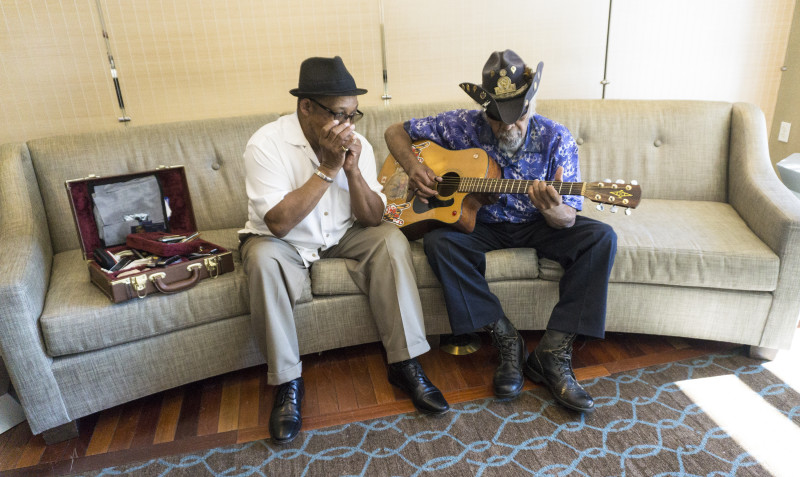
Warner is doing good. He will probably outlive all of us. Warner is a rough character, man. You know, he got sick out West and they wanted me to bring him to the doctor as soon as he got back home and I couldn’t even find him for a couple of days and he was all right, you know. So, he’s doing good. He uses old remedies, I think. But I think he’ll go a long way. He has a little problem hearing, but he gets by with that. I don’t know if he just plays what he feels or what. He still can play.
The other night, we were doing a show and it was time to take a break. I mean, I told him, I said, “Warner, I have to walk away from him to stop from playing.” And sometimes he’ll still play. He’ll play all night. One night we played at a club in D.C., and he played for four straight hours. And then he asked if I wanted to take a break. I said, “It’s time to go home, Warner.” He said, “No” and just kept going. He is 87 and plays like a teenager. I don’t know how he does it. I just don’t know. He’s been in the hospital a couple of times, but he was there and he was sick and he played music there. Every time he went in the hospital, he said, “Give me my guitar,” and he’d want to sit down and play music. And the people there didn’t want him to leave.
We both had had day jobs. I drove a school bus and he worked right beside me at the bus lot and he worked at Park and Planning, which was right beside each other. We would leave work and go to open mics or something and play. People started coming around and when we played the places were packed. A lot of people followed us around. That’s how Nick Spitzer heard about us. The biggest gig we ever did was open up for Jackson Browne on the 4th of July for 400,000 people. And at the Wolf Trap gig with Joe Louis Walker and Junior Brown and at the Folk Festival in Maine in Bangor.”
He told interviewer Dr. Barry Lee Pearson
“Me and Warner, we can’t get separated. Some people say we remind them a lot of Sonny Terry and Brownie McGhee, even the way we talk to each other. But we have fun. We been on the road for a long time, we been through a lot. He had an old van; we drove around for years. We run around like that for a long time…I really respect Mr. Warner and his music. People need to know that that he’s there, because there’s a lot of people I admire playing the blues, but he’s the real deal.”
Warner Williams and Jay Summerour are among the last of the true blues players, a traditional deep roots guitar-harmonica duo in the Piedmont tradition, part of America’s blues and songster legacy, part of America’s cultural pride. Phil Wiggins calls it “the real homemade Washington, D.C. blues.” Guy Clark referred to it “Stuff that’s real, stuff you feel.”
It gets right into your soul.
[1]Justin Jouvenal, The Washington Post, For Guitar Man Warner Williams, passion outshines spotlight
September 5, 2011.
[3]Pearson, Barry Lee.Warner Williams. I been knowing music all my life. Living Blues. #145. May/June 1999.24
[4]Pearson, Barry Lee. Liner notes to Classic African American Songsters from Smithsonian Folkways. SFW CD 40211.
[5]Pearson, Barry Lee. Warner Williams. I been knowing music all my life. Living Blues. #145. May/June 1999.24
[6]Nick Spitzer is a folklorist and producer and host of American Routes, and a professor of anthropology and American studies at Tulane University.
[7]Archie Edwards barbershop in Washington, D.C. was the epicenter of the local African American acoustic blues scene, with weekly jams every Saturday afternoon.
